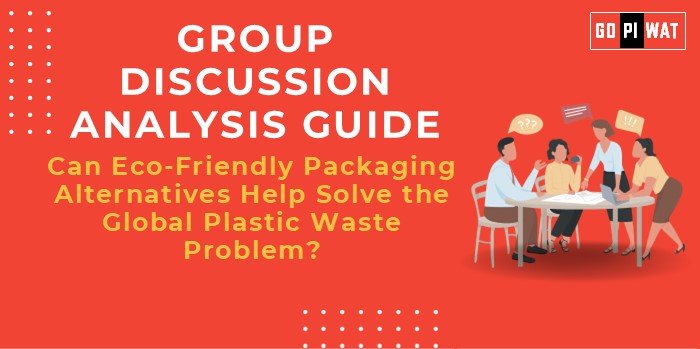📋 Group Discussion (GD) Analysis Guide
Can Eco-Friendly Packaging Alternatives Help Solve the Global Plastic Waste Problem?
🌐 Introduction to the Topic
- 🌍 Opening Context: Globally, approximately 400 million tons of plastic waste is generated annually, with packaging contributing over 40%. Eco-friendly packaging alternatives are increasingly promoted to mitigate environmental damage and shift toward a circular economy.
- 📖 Topic Background: Since the 1950s, plastic has revolutionized industries but has also led to severe environmental consequences. Recent innovations in biodegradable materials, government bans on single-use plastics, and public awareness campaigns spotlight this topic’s urgency.
📊 Quick Facts and Key Statistics
- 🌐 Global Plastic Production: 390 million tons annually, with packaging contributing 40%.
- ♻️ Recycling Rates: Only 9% of all plastic produced has been recycled.
- 📈 Eco-Friendly Market Growth: Expected to reach $237 billion by 2027 (CAGR of 5%).
- 🌊 Marine Pollution: 11 million tons of plastic enter oceans yearly.
- 📜 Policy Milestone: 100+ countries have enacted bans or restrictions on single-use plastics.
🌍 Stakeholders and Their Roles
- 🏛️ Governments: Enforce regulations, incentivize eco-friendly practices, and fund R&D.
- 🏭 Private Sector: Develop and adopt sustainable packaging solutions.
- 👥 Consumers: Demand eco-conscious products and adopt responsible disposal practices.
- 🌱 NGOs and Activists: Drive awareness and advocate for stricter regulations.
🏆 Achievements and Challenges
Achievements:
- 📜 Policy Success: EU’s ban on single-use plastics since 2021 has reduced waste by 25%.
- 🏢 Corporate Initiatives: Coca-Cola aims for 100% recyclable packaging by 2030.
- 💡 Biodegradable Innovations: Materials like PHA and PLA are now commercially viable.
Challenges:
- 💸 Cost Barrier: Biodegradable alternatives can be 2-5x costlier than conventional plastic.
- 🏗️ Infrastructure Gaps: Limited facilities for recycling and composting biodegradable materials.
- 🤔 Consumer Behavior: Resistance to change and lack of awareness about alternatives.
🌐 Global Comparisons
- 🇩🇪 Success: Germany recycles 56% of its plastic waste, leveraging advanced sorting technologies.
- 🇮🇳 Failure: India’s plastic ban struggles due to enforcement challenges and lack of alternatives.
📚 Case Studies
🏛️ Netherlands: Circular economy model promotes reusable packaging for retailers.
💬 Structured Arguments for Discussion
- ✅ Supporting Stance: “Eco-friendly packaging offers a viable solution by reducing non-biodegradable waste and fostering innovation.”
- ❌ Opposing Stance: “Without global infrastructure for waste management, eco-packaging adoption will remain uneven.”
- ⚖️ Balanced Perspective: “Eco-friendly packaging is a critical component of waste management but requires systemic support for scalability.”
🗣️ Effective Discussion Approaches
Opening Approaches:
- 📊 Start with a global statistic: “400 million tons of annual plastic waste is reshaping our ecosystems…”
- 📖 Case study introduction: “The Netherlands demonstrates how a circular economy reduces packaging waste effectively…”
Counter-Argument Handling:
- 💡 Address cost: “Short-term costs are offset by long-term environmental and economic benefits.”
- 🔄 Highlight systemic change: “Innovations in waste management complement eco-packaging efforts.”
📊 Strategic Analysis of Strengths and Weaknesses
SWOT Analysis:
- 💪 Strengths: Reduces pollution, fosters innovation.
- ❌ Weaknesses: High costs, limited consumer awareness.
- 🌟 Opportunities: Government incentives, growing demand for sustainability.
- ⚠️ Threats: Industry pushback, insufficient global infrastructure.
🎓 Connecting with B-School Applications
- 🌍 Real-World Applications: Insights into sustainable supply chains, policy analysis, and market opportunities in eco-packaging.
- 🎯 Sample Interview Questions:
- How can private players overcome cost barriers for biodegradable packaging?
- Evaluate the role of consumer behavior in transitioning to eco-friendly materials.
- 📘 Insights for B-School Students: Sustainability is a core theme in strategy, supply chain, and marketing projects.


